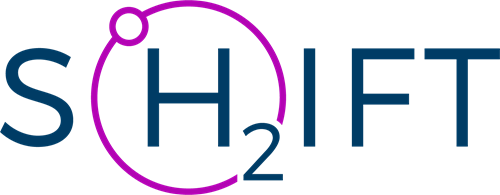Partners
The SH2IFT project is coordinated by SINTEF Industry, other partners include SINTEF Energy Research, Norwegian University of Science and Technology (NTNU), The Institute of Transport Economics, RISE Fire Research and Christian Michelsen Research.
SINTEF Industry (project coordinator)
SINTEF is an independent, non-profit research foundation, one of the largest independent contract research organizations in Europe. It is a multidisciplinary organization performing contract research, ranging from basic through applied research to commercialisation of results. The research team New Energy Solutions has more than 20 years' experience in hydrogen technology, varying from basic material research to coordination of demonstration projects, both nationally and internationally. Relevant examples with respect to safety, guidelines and public acceptance are related to projects on hydrogen heavy duty trucks, hydrogen ferries.
SINTEF Energy Research (SER)
SINTEF Energy Research has considerable experience from former and on-going projects on hydrogen liquefaction, which is one of the key technologies for which considerable improvement from state of the art is required. In the EU FP7 FCH-JU project IDEALHY (2011–2013), which pinpointed the long-term realistic potential for reducing the power demand for liquefaction by about 50%, SINTEF ER was in charge of the work packages concerning modelling and simulation activities. In 2014 and 2015 we completed three industrial projects with foreign clients related to production and liquefaction of hydrogen. Currently, we are leading the KPN project Hyper focusing on large scale hydrogen production and liquefaction and the ACT project ELEGANCY focusing on large scale hydrogen and CCS chains.
Norwegian University of Science and Technology (NTNU)
NTNU has the main responsibility for higher education in technology in Norway, and it is the country's premier institution for the education of engineers. Nicola Paltrinieri is part of the RAMS group within the NTNU department of Mechanical and Industrial Engineering. RAMS stands for Reliability, Availability, Maintainability and Safety. The RAMS group is multidisciplinary and has deep understating of both mathematical/physical tools and concrete industrial systems. The RAMS group is acknowledged as one of the world-leading academic group in the domain.
The Institute of Transport Economics (TØI)
The Institute of Transport Economics has a broad competence in transportation research and unique knowledge of the transportation sector in Norway. TØI holds an extensive research experience on transport safety, technology, and transport policies. The research team from TØI have specialized competence on vehicle technology, implementation and implementation barriers, as well as decision making processes and users perspectives. TØI is a partner and WP leader in the project ELECTRANS (ENERGIX), studying institutional barriers to electrification of the transport sector and providing management tools and policy recommendations. TØI also leads RA4-l: Policy & Techno-economic Analysis in FME MoZEES.
RISE Fire Research (RFR)
RISE Fire Research is a research institute, jointly owned by SINTEF and RISE Research Institutes of Sweden. RFR offers fire technical expert services for a fire safe society to industries and parts of the society where fire constitutes a risk. We have one of Europe's largest fire test facilities, and conduct small to large scale standardized and tailored fire tests, both for commercial assignments and in research projects. Our main activities are analytical and experimental research on fire safety, -dynamics, -prevention and mitigation, -testing, -investigations and risk assessment. We have high expertise in oil & gas fires and tunnel safety.
Christian Michelsen Research (CMR)
CMR develops state-of-the-art measurement technology and advanced software for visualization and monitoring. Gexcon develops and validates the CFD code FLACS that is widely used for consequence modelling related to dispersion, fire and explosion scenarios in industry. Gexcon owns all intellectual property rights for FLACS. Gexcon has extensive experience from EU-funded projects, such as Dust Explosion Simulation Code (DESC) in FP5, HySafe in FP6 and CO2PipeHaz in FP7, and is currently the coordinator for the HySEA project in Horizon 2020. Prototech develops hydrogen fuel cell systems for various applications, such as maritime, offshore and space.
